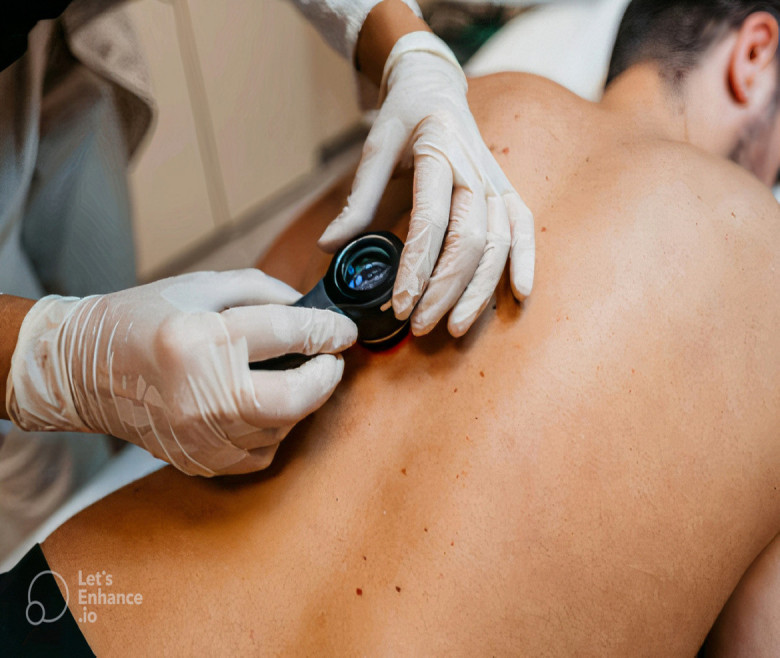Squamous Cell Carcinoma Symptoms & Treatment: A Complete Guide

What Is Squamous Cell Carcinoma?
Squamous Cell Carcinoma (SCC) is one of the most common types of skin cancer. Though it often starts as a small, easily treatable lesion, it can become aggressive if left untreated. SCC typically develops on skin areas frequently exposed to the sun, such as the face, neck, scalp, and hands. In Ireland and Northern Ireland, SCC is prevalent, alongside other skin cancers like basal cell carcinoma and melanoma. Early detection is key, as timely intervention significantly improves the prognosis of SCC.
How to Identify Squamous Cell Carcinoma Symptoms
Understanding the symptoms of SCC can help in early identification. Look for the following signs, particularly in sun-exposed areas:
● Red, Scaly Patches: Patches of red, dry, or scaly skin that may bleed if irritated.
● Persistent Sores or Ulcers: Sores that don’t heal, especially on the face, neck, hands, or scalp.
● Wart-Like Growths: Rough or wart-like lesions that can appear on exposed skin areas.
● Crusting or Oozing Spots: Raised lesions that crust over or ooze periodically.
If you notice any of these symptoms, it’s wise to consult a dermatologist. Early evaluation can prevent the condition from progressing to a more invasive stage. Newry Private Clinic’s dermatology services offer personalised diagnosis and treatment for SCC symptoms.
Common Causes and Risk Factors for Squamous Cell Carcinoma
Several factors can increase your risk of developing SCC, including:
● UV Exposure: Prolonged sun exposure is the primary cause of SCC. People with fair skin, light-coloured eyes, and blond or red hair are at heightened risk.
● Sunburn History: Past instances of severe sunburn, especially in childhood, increase SCC risk.
● Weakened Immune System: Immunocompromised individuals are more susceptible to SCC and other skin cancers.
Practising sun protection by using SPF, wearing protective clothing, and scheduling regular dermatological screenings is vital for those at higher risk.
How Squamous Cell Carcinoma Is Diagnosed
A dermatologist will use various diagnostic methods to identify SCC accurately. These include:
● Skin Biopsy: Removing a small sample of skin for lab analysis to confirm the presence of cancer cells.
● Skin Shaving or Mole Removal: To examine deeper layers of skin for cancerous growths.
● Blood Tests: These are less common but may be used to assess overall health and immune function, particularly for advanced cases.
Consider booking a dermatologist appointment at Newry Private Clinic for a full consultation. Here, the private dermatologist will review your medical history, conduct a physical examination, and design a care plan suited to your needs.

Squamous Cell Carcinoma Treatment Options
Treating SCC depends on its stage and location, with options tailored to each case:
● Surgery: Removal of the tumour is often the first line of treatment, especially for localised lesions.
● Cryotherapy: Freezing off the cancer cells, often effective for superficial SCC.
● Topical Chemotherapy: Creams containing anti-cancer agents, suitable for surface-level lesions.
● Radiation Therapy: Applied for deeper, more invasive cancers, or cases where surgery isn’t possible.
● Chemotherapy and Immunotherapy: Reserved for advanced SCC with a risk of metastasis, especially if the cancer has spread to other areas.
To explore the most appropriate treatment for your condition, complete the ‘Talk to us today’ form on Newry Private Clinic’s dermatology page for a confidential consultation with one of our private dermatologists.
Understanding Prognosis & The Importance of Early Treatment
When detected early, SCC generally has an excellent prognosis, with low recurrence and minimal risk of metastasis. Early intervention helps avoid more invasive treatments, reducing potential complications. Survival rates for early-stage SCC are high, underscoring the importance of timely dermatological care and follow-up exams.
Steps to Prevent Squamous Cell Carcinoma
Prevention strategies are essential, especially for those at increased risk. Consider these tips:
● Daily Use of SPF: Apply sunscreen with at least SPF 30 daily.
● Protective Clothing: Hats, sunglasses, and long-sleeved shirts offer an additional layer of protection.
● Avoid Peak Sun Hours: Try to stay out of direct sunlight between 10 am and 4 pm.
● Routine Skin Checks: Schedule regular appointments with a dermatologist for thorough skin checks, especially if you notice unusual spots or changes.
Self-exams can also help; if you find any concerning spots or lesions, make an appointment with a dermatologist promptly.
Frequently Asked Questions About Squamous Cell Carcinoma
● What are the early warning signs of SCC? Common signs include red, scaly patches and sores that don’t heal.
● How quickly does SCC spread? SCC can spread if untreated, so early intervention is essential.
● Is SCC treatment covered by insurance? Many insurance plans cover SCC treatments, though it’s best to check with your provider.
● What is a typical treatment timeline? Treatment length depends on the type and severity of SCC. Early-stage SCC can often be treated in a single session.
For more personalised answers or concerns regarding SCC, consult a private dermatologist at Newry Private Clinic.
Ready to Prioritise Your Skin Health?
If you’re experiencing symptoms or would like to learn more about treatment options, book an appointment with one of our private dermatologists at Newry Private Clinic. Complete the ‘Talk to us today’ form on our dermatology services page, or call us directly for a confidential consultation.
